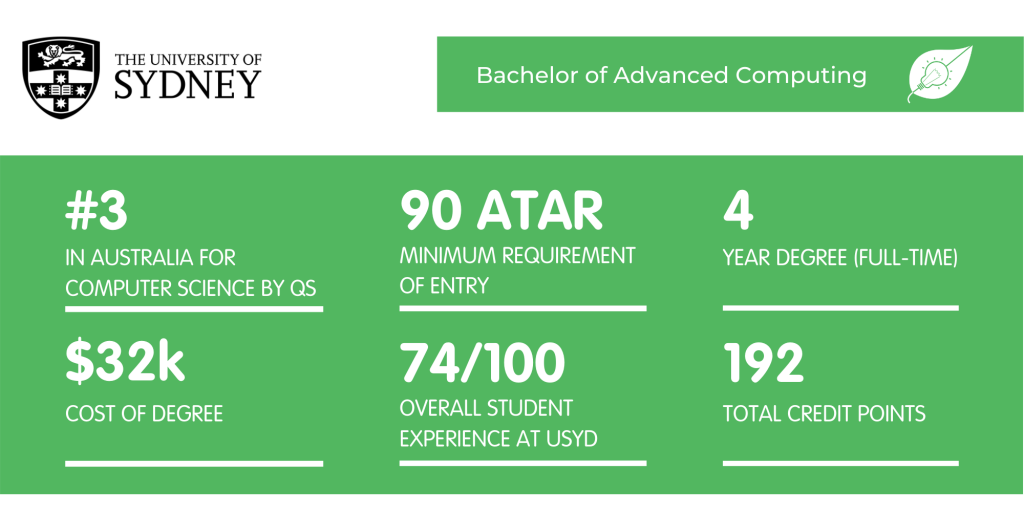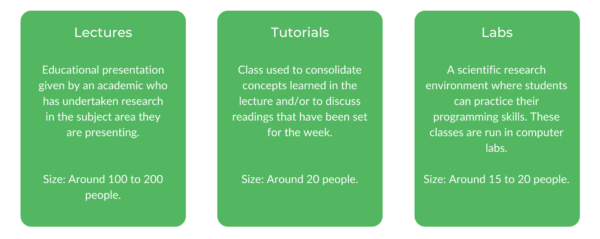
Are you interested in studying a Bachelor of Advanced Computing at USYD, but want to know what it’ll be like?
We tackle all of your questions and tell you what you need to know about the degree, including majors, core units, and assessments, culture and more!
Keep scrolling to find out more!
What is a Bachelor of Advanced Computing at USYD?
Core Units and Majors
How to Get into a Bachelor of Advanced Computing at USYD
What’s the Teaching Format?
What’s the Faculty and Culture Like?
What is a Bachelor of Advanced Computing at USYD?
A Bachelor of Advanced Computing at USYD involves learning about different aspects of computing and information technology. You will learn about software design, the creation and designing of technologies, analysing data, and how to write code in several programming languages.
You can choose to study the degree on its own or with another Bachelor’s degree in Commerce, Science, Health Science, or Medical Science. The second degree will add another year to your studies, meaning that you can study for five years and walk away with two degrees!
Honours
The Bachelor of Advanced Computing at USYD has an embedded Honours program, meaning that every student can undertake a research project in their fourth (and final) year. But, to be awarded with Honours you will have to write a thesis of high enough quality.
Completing an Honours degree not only furthers your knowledge of Computer Science, but it will give you a taste of academic research which you can follow to complete a PhD (a Doctor of Philosophy) and work in academia. However, if Honours doesn’t take your fancy there is the option to finish the degree after three years (without Honours), but you’ll receive the Bachelor of Computing instead.
Career Paths
The degree is accredited by the Australian Computer Society. This means that you’ll graduate with the knowledge and skills needed to be an ICT professional.
But, your career choices are anything but limited, with potential careers including:
-
- Computer programmer
- Computer system administrator
- Consultancy
- Information services management
- Systems analyst
- Software engineer
- Web development and management
- Big data developer
- Information security analyst
- Data scientist
- Network and database administrator
- Chief technology officer
- Health field
- Banking and finance field
- Government and defence
- Retail
- Startups

Core Units and Majors
What are the Core Units?
In first year, you’ll be studying a mix of mathematics, programming, and data science. These ten units make up the core first year units no matter what specialisation you choose.
As you progress into second and third year, there are fewer core units — think software development, information management, and intermediate computing subjects among others — and more room for elective units and the units that are specific to your majors.
Finally, in fourth year the only core units you need to take will be related to your Honours project. These units will help you develop the skills needed to write a thesis and undertake academic research.
Majors
To undertake a Bachelor of Advanced Computing at USYD, you will need to complete two majors. The first will be a specialisation in computing, with a choice of computer science, information systems, software development, or computational data science.
Your second choice comes from a shared pool of over 100 study areas. Whether you want to double down on computing and engineering or pursue your passion in science, education, or another area of interest, there is plenty of choice!
Internships and Placements
You can gain practical experience through this degree, as the Professional Engagement Program is embedded into all undergraduate Engineering and IT degrees. You can learn more about it here!
The Faculty of Engineering also offers industry placements, work experience, and internships which you can find here. Or, you can apply for the paid Engineering Vacation Research Internship program, where you can work on a research project related to computer science.
Find out more about it here!
How to Get into a Bachelor of Advanced Computing at USYD
The ATAR cut off for a Bachelor of Advanced Computing is an ATAR of 90. If you don’t meet the ATAR requirements, you can find out about other admission pathways here.
For example, you can receive bonus points for your ATAR if you perform well in HSC Mathematics and extension subjects. If you get a Band 5, you’ll get an additional three points, with up to five being awarded if you achieve a Band 6 or E4.
You can also start another degree with a lower ATAR, such as the Bachelor of Science with a computing major, study hard, and transfer to Advanced Computing with that year’s results.
Prerequisites and Assumed Knowledge
This degree has a prerequisite of Mathematics Advanced (Band 4) or Mathematics Extension 1 or 2 (Band E3).
The assumed knowledge for Advanced Computing at USYD is Mathematics Extension 1 and/or Extension 2 — while not compulsory it is highly recommended that you take these subjects too!
Scholarships
There are plenty of scholarships available, and you can find those offered for any Faculty of Engineering degree here, or general scholarships for any undergraduate degree at USYD here!
What’s the Teaching Format?
This degree is taught through lectures, labs, and tutorials in following the semester-style throughout the academic year.

Class Structure
You can generally expect to attend 1-3 hours of lectures a week (with about 100 to 200 students attending) which cover the theoretical aspects of your subjects. This is paired with 1 hour tutorials, 2-3 hour labs, or a mix of both.
For units that are more theory-based, you generally attend tutorials. These classes have around 20 students and are more interactive than lectures, involving solving mathematical problems and analysing data.
The lab-style classes will tend to be your longest classes and cover practical skills. The labs are also quite small with around 15 to 20 students, and you can expect to learn how to code (on a desktop computer or your own device) in one of the computer labs.
How many hours do you have to go to university?
Most subjects have a mix of lectures, labs, and tutorials so you can expect to spend anywhere between 20-25 hours per week at uni (for 24 credit points worth of units per semester).
However, you will most likely spend more time studying and working on assignments, so it’s important to manage your time so that you don’t get overwhelmed or fall behind.
What are the assessments like?
Since you are learning how to code, design software, among other practical skills, the assessments are quite practical too! Although they vary across different subjects, most will assess your skills via assignments throughout the semester and a final exam.
The assignments can range in weighting from 5% to 20% each, but they require a lot of work so it’s best not to leave it too late to make a start on them! But, spending a lot of time on each assignment also gives you plenty of practice with a variety of skills and prepares you for meeting deadlines once you reach the workforce.
Final exams tend to be handwritten rather than computer-based and are held at the end of semester. As a result, exams tend to test your knowledge of the theory components of your units while assignments test your practical skills. But, some exams do ask you to handwrite some code so it’s worth revising just as much as theory.
Skills That You Develop

A Bachelor in Advanced Computing allows you to develop practical programming skills and knowledge while refining the critical thinking, mathematical skills, and problem solving skills you will need when you enter the workforce. Plus, team-based assessments and projects will give you soft skills, such as the ability to effectively work in a team and communicate, that you can rely on throughout your career.
Studying a variety of units across subject areas will also allow you to explore different aspects of computing — from coding and security systems, to operating systems and electrical engineering — and develop a well-rounded knowledge base. All of these skills are crucial for a career as an ICT professional and can even be transferred to other lines of work.
Interested in the pros and cons of this degree? Check out our article here!
What’s the Faculty and Culture Like?
Faculty
The School of Computer Science is one of the smaller schools and the staff that you’ll meet while studying a Bachelor of Advanced Computing are very supportive, passionate, and hardworking. The lecturers and tutors are knowledgeable and enthusiastic about their subjects, want you to succeed, and are active on subject forums where they answer student queries and help solve problems.
Culture
Because of its size in comparison to larger Science and Engineering faculties, the culture within the School of Computer Science at USYD is tight-knit. And, the abundance of core units means that you are likely to see familiar faces and make friends across your subjects.
Societies
Societies are a great way to make friends, network with other like-minded students, or even pursue a hobby or interest!
When it comes to those offered to Computer Science students, the Sydney Computing Science Society (or SYNCS) is a great place to start. They hold a host of events throughout the semester — from social trivia nights to challenging weekend-long hackathons and programming ‘Help desks’, where you can network, connect with employers, or socialise.
The ‘Help desks’ are quite supportive, and enlist more senior (and more experienced) students who can help you solve problems you have with your code or show you how to solve other computer science problems in a tutorial-style format.
Plus, there are plenty of other societies that are course or career-related, such as Women in Technology, or the Science Society, and some interest-focused societies like TeaSoc (the Tea Society), SUTEKH (Sydney University Pop Culture and Games Society), the Sydney University DJ Society, and more.
Check out the full list of Sydney Uni societies here!
Rachel Fieldhouse is a Content Writer at Art of Smart Education and has just completed a double degree in Science and Arts at The University of Sydney, majoring in Chemistry, English, and Linguistics. Rachel’s writing has been published in Concrete Playground, Inside Enterprise, Planting Seeds, and SURG FM, and she currently writes blog posts for Remi AI, a Sydney-based Artificial Intelligence firm. When she’s not writing, you can find Rachel playing her saxophone or flute, or relaxing with some sudoku.


